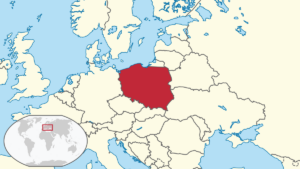Content
- Culture
- Let’s Start with Numbers
- Fundamental Information about E-commerce in Poland
- Shopping Patterns
- What Influences the Trustworthiness of a Business?
- Tips for Localization
- Administration
- Conclusion
Culture
Most of the population consists of Polish people, who are proud of their nation and strongly bond with their region.
¡The REGION in which a Polish person is born and where their family comes from plays an important role!
In a survey supported by Terazpolska, respondents were given a choice, with 78.3% saying they would buy products of Polish origin (summarized with the answers “definitely yes” and “rather yes”).
The Polish market is becoming more difficult for foreign entrepreneurs. For several years there has been a trend to buy Polish products and especially to support small local businesses.
This trend is effectively used by entrepreneurs who build their brand on the basis of regional origin, multi-generational tradition and Polish capital.
This fact is quite well known, but I must mention that 94% of Poles are Catholic. Therefore, many products on e-shops can be of a more conservative type.
Let’s start with numbers.
Poland is the sixth country with the largest population in Europe. More than 38 million people live here, of whom 84% of Poles use the internet regularly.
Covid has influenced e-commerce around the world and Poland is one of the examples where responding to market change at the right time has paid off, making it one of the fastest-growing markets in Europe.
Approximately 150,000 companies sell online either through their own websites or on Allegro, the most popular online shopping platform in Poland.
The biggest player according to ecommerceDB, on the Polish e-commerce market (by net sales in 2022) is mediaexpert.pl. This shop has had sales of USD 1,293 million.
The graph below shows the increase for two factors:
- the number of households with internet access,
- the number of internet users.
The difference between 2013 and 2022 is more than 30%.
Fundamental information about e-commerce in Poland
According to a report from Ceneo, the highest number of online shoppers is between the ages of 35 and 44 years old, with more than half of this group being women. The second largest group is from 25 to 34 years old, where, again, women are the majority. You can see the other groups below.
However, it needs to be clarified that 54% of online shoppers in the Polish market are women and 46% are men.
By dividing the market this way, we acquire useful information about the most popular category based on gender.
Women search the most for home and interior (12.3%), building and renovation (10.6%), things for kids (9.8%), health (9.2%) and home appliances (8.6%).
The most searched categories by women are home and interior while man search for building and renovation.
The search looks a little different for men. Building and renovation (17.6%) ranks first, followed by home appliances (7.3%), consumer electronics (6.8%), gardening (6.8%) and motoring (6.8%).
PRICE – a lot of attention goes to this factor! Polish “internauts” = internet users give a lot of value to the price. If they want to buy, for example, electronics, conducting long-term research is required in order to make the price as appropriate to the quality of the product as possible.
The official Polish currency is the Polish zloty, but there are options to arrange payment methods in other currencies such as EUR.
If you’re still here and thinking about expanding abroad, check out our website, where you can also fill out the non-binding contact form.
Shopping patterns
Payment methods are particularly important for this market.
- 59% – the most used is fast payment “szybka płatność”. BLIK is one of the examples.
- 23.5% choose payment at pickup
- 9.3% opt for payment directly to the store’s account
- 8.1% use a credit card
- 0.1% prefer installments
Another piece of useful information is the form of delivery.
Courier is the most popular option in Poland (55.8%), followed by 34.5% pick-up point (e.g. Paczkomat). One of the least used forms is the personal pick-up (5%).
What influences the trustworthiness of a business?
The predominant indicator of trustworthiness for users in Poland accounting for 25% is having a Store rating. Perhaps it’s not surprising that the second-highest indicator is Returns and Warranty Policy accounting for 13.8%. Furthermore, the Store that is registered in Poland adds trust to 13.6%. If you already own a well-known brand, it is also a factor in the ranking (12.4%).
The Polish market is innovative and open for business, however without the factors illustrated as an example above, the trust won’t be that high and one might face slower growth as well as lower turnover.
¡40% of Polish people expect a response from the customer service center within one hour!
There is no need to mention this point, as it probably goes without saying, but it is essential to hire native speakers for customer service and especially to include among the phone contacts, the Polish ones as well.
Help for localization
Polish language and correct language localization are essential, so here are some tips:
- The way of addressing, and controlling the interference of other languages on the PL web
- Setting up a Polish phone number and email
- Providing customer service in Polish
- Customizing the length of content and broad product description (e.g. rich content strategy)
- Adding local certificates to the website to confirm the reliability
- Transparent portrayal of available delivery and payment options (e.g. BLIK)
- Correct currency settings (PLN), VAT 23% and invoicing
- Optimization of the website for Google PL
If you also want to know about the expansion to Hungary, take a look at our article.
Administration
When setting up a Polish company, it is optimal to register the company directly as “sp. z.o.o.” (spółka z ograniczoną odpowiedzialnością) – the equivalent of the Czech s.r.o. (aka. Ltd).
This activity will ease service registrations and avoid unnecessary complications.
When it comes to VAT, it is initially recommended to sell with the application of Czech VAT, since the basic rate of this period reaches 23% in Poland. Applying Czech VAT will become a competitive advantage, as well as opening a bank account in Poland. It will add credibility and also save on international fees.
If you’re still hesitant about having your own branch in Poland but want to cooperate with domestic companies, you will need a Tax Residency Certification, without that cooperation WON’T be possible.
In conclusion
The numbers are more than clear and show that the Polish expansion is a great opportunity, but also comes with a lot of competitiveness. More than 93% of the population has access to the internet, and out of that, 90% shop online.
In the end, price is what makes the difference. At the same time, as mentioned earlier, internet users expect the fastest possible support with native speakers.
ATTENTION! Properly localized Polish and the website are one of the main keys to success.
To this, I must add that running an e-shop should only be on a Polish domain! Trends are changing, but Polish people remain sceptical about shopping from foreign e-shops.
To sum up, it’s a market that is rather for more experienced players in e-commerce.

